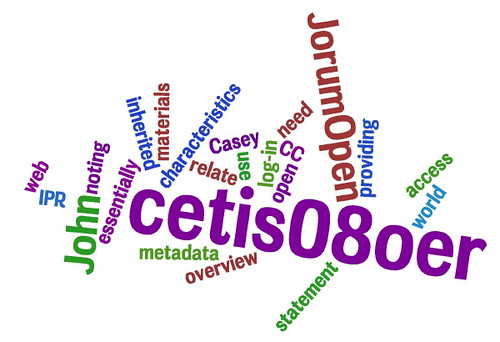Here, somewhat belatedly, is a summary of the discussions that followed the presentations at the Open Educational Resources session at CETIS 08.
Much of the discussion focused on technical issues such as infrastructure, the role of standards (or not), granularity of resources, metadata and tagging.
There appeared to be considerable support for the idea of enabling projects to make use of existing services and applications such as flickr, youtube, slideshare, etc while at the same time mandating deposit in JorumOpen. However this did lead some participants to question the role of standards in this programme and in the sector more widely. If we say that content can be released in any format and hosted by multiple applications does this mean that we are implicitly stating that open educational standards such as IMS Content Packaging are no longer relevant? Of course this is not the case at all, the real goal here is interoperability and standards still play an important role in facilitating interoperability. However there is no point in mandating the use of standards where they are inappropriate e.g. IMS CP for video of lectures. Andy Powell also made the valid point that:
…the Flickrs of this world are not devoid of standards – e.g. support for RSS “ its just that they aren’t necessarily the same standards that we have recommended for the last few years.
The role of JorumOpen was also explored and John Casey for the Jorum team gave a brief potted history of the Jorum service. John explained that, typically of the education sector more generally, Jorum has been very risk averse in the past, however JorumOpen will see a significant shift towards a more user centric approach based on Creative Commons licensing.
Despite being at pains to avoid the œM word issues relating to metadata occupied a large part of the discussion. It was generally agreed that the programme should take a light weight approach to metadata and that the focus should be on tagging rather than on the creation of formal structured metadata records. There was some support for a minimal set of tags but much less agreement as to what these should be: title, author date, institution, course, subject?? Also is it meaningful to mandate a single set of programme level tags when resources will be scattered across multiple applications such as youtube, slideshare, etc, each of while have their own tagging and metadata conventions?
This also led to a very interesting discussion on the nature of attribution, reputation and digital and academic identity. Pat Parslow, following the discussions remotely via the wonderful eFoundations live-blog suggested:
Contributing materials, and formulating correct tags/metadata helps build your Digital Identity and thus reputation. Should be a major interest for academics, surely?
Heather Williamson of JISC noted some initial findings from the current RePRODUCE programme that suggest that building online presence is an important driver for people to share resources. My colleague John Robertson has already written an excellent blog post on open educational resources, metadata and self description which I highly recommend.
Throughout these discussions David Kernohan and Amber Thomas of JISC reminded us that this programme has two goals: changing attitudes and practice and getting content out into the open. The real aim of the JISC OER programme is to change the culture around content sharing and as such it should be viewed as a œmilestone on a journey.
Patrick McAndrew of the Open Universitys OpenLearn project agreed and cautioned against letting the perfect become the enemy of the good. Fear of œnot doing it right shouldnt be a barrier preventing people from opening access to their content. We can all learn as we go along.
As Andy Powell has already pointed out in his blog post on the CETIS 08 Conference the OER session generated
…a good level of debate that could have gone on significantly longer than the time allowed.
In order to enable these discussions to continue we would like to invite colleagues to use the CETIS Educational Content SIG mailing list, cetis-ecsig@jiscmail.ac.uk as a forum to raise issues, comments and questions relating to the JISC OER call specifically and open educational content issues more generally.
And last but not least here’s the wordle generated from the session’s tweets.



